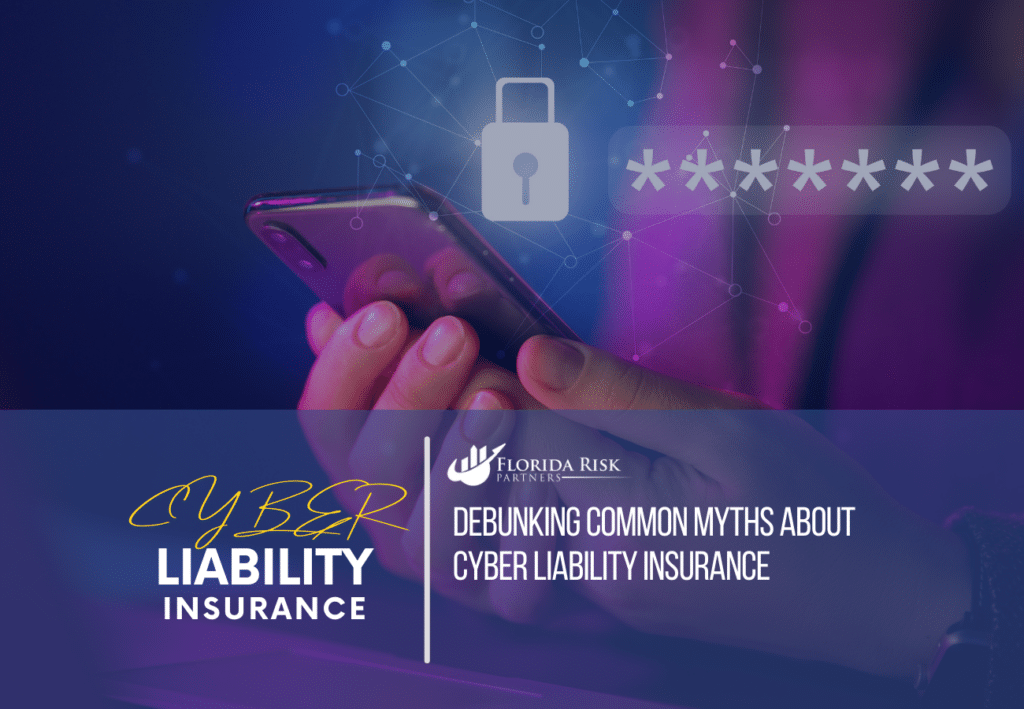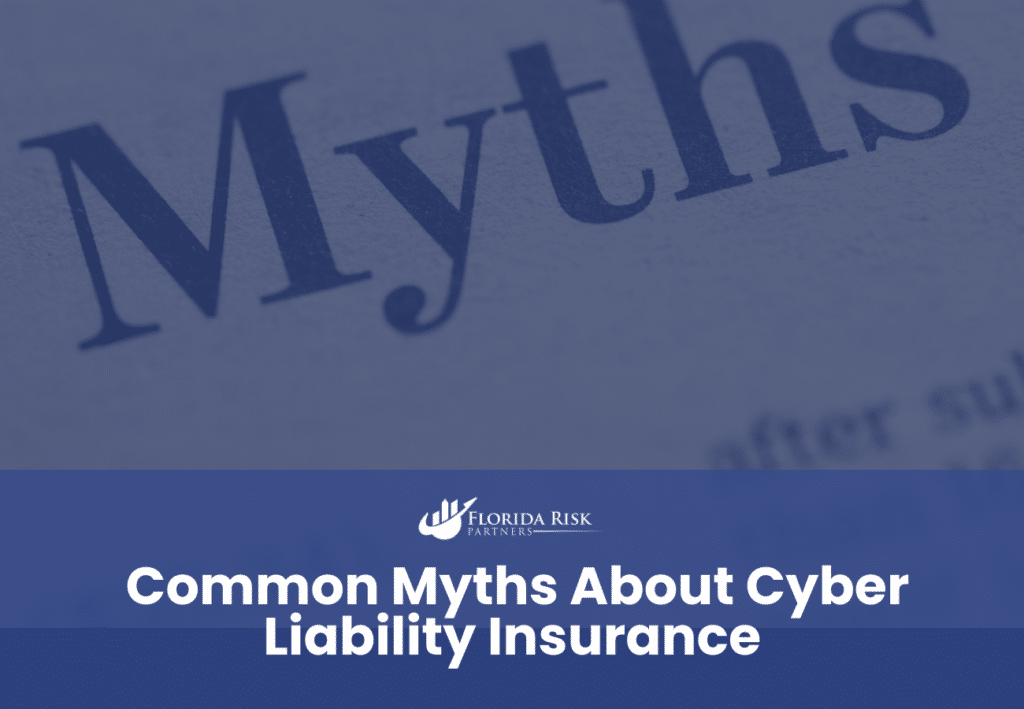-
Main Office: 1434 E. Bloomingdale Ave Valrico, FL 33596-6110
-
Phone: (888) 601-6660
-
Email: info@floridariskpartners.com

Cyber threats are a constant presence in today’s digital world, yet many businesses are still underprepared for the financial and operational fallout of a cyber incident. One major reason for this is a lack of understanding—or outright misconceptions—about cyber liability insurance. Myths surrounding this essential coverage often prevent business owners from exploring it as part of their risk management strategy.
In this blog post, we’ll debunk the most common myths about cyber liability insurance, helping you gain clarity and make informed decisions about protecting your business from cyber risks.
Why Misconceptions About Cyber Liability Insurance Are Dangerous
Misunderstandings about cyber liability insurance can lead to gaps in your coverage and leave your business exposed to significant risks. Without the right protection, a cyber incident can result in devastating financial losses, reputational harm, and even legal consequences. Addressing these myths head-on is crucial to ensuring your business is prepared for the challenges of today’s cyber threat landscape.
Common Myths About Cyber Liability Insurance
Let’s explore some of the most pervasive myths about cyber liability insurance and uncover the truth behind them.
Myth 1: “My Business is Too Small to Be Targeted”
Many small and mid-sized business owners believe they don’t need cyber liability insurance because they assume cybercriminals only target large corporations. Unfortunately, this couldn’t be further from the truth.
The Reality:
Small businesses are actually prime targets for cyberattacks. Hackers often view them as easier targets due to their limited cybersecurity defenses. According to recent studies, over 40% of cyberattacks are directed at small and mid-sized businesses. These incidents often result in significant financial damage, as smaller businesses typically lack the resources to recover quickly.
Why This Matters:
No business is immune to cyber risks. Regardless of size, if your company relies on digital systems, stores customer data, or conducts online transactions, you’re a potential target.

Myth 2: “My IT Security is Enough”
Many businesses invest in firewalls, antivirus software, and employee training programs, assuming these measures will fully protect them from cyber threats. While these are essential components of a strong cybersecurity strategy, they aren’t foolproof.
The Reality:
Cyber threats are constantly evolving, and no system is 100% secure. Even with the best security measures in place, human error, sophisticated attacks, or vulnerabilities in third-party systems can lead to breaches. Cyber liability insurance doesn’t replace your cybersecurity efforts—it complements them by providing financial protection when those efforts fall short.
Why This Matters:
Think of cyber liability insurance as your safety net. It steps in to cover the costs of recovery, legal fees, and customer notifications when a breach occurs.
Myth 3: “It’s Too Expensive”
Another common misconception is that cyber liability insurance is prohibitively expensive, especially for small businesses operating on tight budgets. This belief often prevents business owners from exploring their options.
The Reality:
Cyber liability insurance is often more affordable than business owners expect, particularly when considering the potential costs of a cyber incident. Policies can be tailored to fit your budget and risk profile, with premiums varying based on factors like your industry, revenue, and cybersecurity measures.
Why This Matters:
Investing in cyber liability insurance is a cost-effective way to protect your business from potentially devastating financial losses. The premiums are a fraction of the costs you’d face without coverage in the event of a breach.
Myth 4: “It’s Only for Companies That Handle Sensitive Data”
Some businesses assume that this insurance is only necessary for companies handling highly sensitive information, like healthcare providers or financial institutions. If your business doesn’t collect Social Security numbers, credit card details, or medical records, you might think you don’t need this coverage.
The Reality:
Cyber liability insurance is not just for companies handling sensitive data—it’s for any business that relies on technology. For example:
- A ransomware attack could lock your systems, halting operations.
- A DDoS attack could take your e-commerce site offline, leading to lost revenue.
- A phishing scam could compromise your financial accounts.
Why This Matters:
If your business uses digital systems to operate, you’re at risk of cyber threats. Cyber liability insurance covers a wide range of scenarios beyond just data breaches.

Myth 5: “My General Liability Insurance Covers Cyber Incidents”
Many business owners mistakenly believe their existing insurance policies, like general liability or property insurance, will cover the costs of a cyber incident. This assumption often leads to insufficient coverage.
The Reality:
Most traditional insurance policies specifically exclude cyber risks. For example:
- General Liability Insurance: Covers physical injuries and property damage but doesn’t address digital risks.
- Property Insurance: Protects physical assets like buildings and equipment, not intangible assets like data.
- Errors and Omissions Insurance: Covers professional mistakes but often excludes damages caused by cyber incidents.
Why This Matters:
Cyber liability insurance is designed to fill the gaps left by traditional policies, addressing the unique risks associated with cyber threats.
Myth 6: “Claims Are Too Difficult to Prove”
Some business owners worry that filing a cyber liability insurance claim will be overly complex, or that their claim might be denied due to unclear policy language or lack of evidence.
The Reality:
While the claims process does require documentation, insurers typically provide clear guidance and support to help you navigate it. Many policies also include access to breach response teams that can assist with evidence collection, legal requirements, and mitigation efforts.
Why This Matters:
Working with a knowledgeable broker and choosing a reputable insurer ensures you’ll have the support you need when filing a claim.
Overcoming the Myths and Taking Action
Understanding the truth behind these myths is the first step toward protecting your business. Cyber liability insurance is an essential tool for managing the risks of today’s digital landscape. Here’s how to get started:
- Evaluate Your Risks
Conduct a cyber risk assessment to identify your vulnerabilities and potential exposures. - Research Policy Options
Compare policies from different insurers, focusing on coverage areas like data breach costs, business interruption, and ransomware payments. - Work with a Broker
A knowledgeable insurance broker can help you navigate the complexities of cyber liability insurance and find a policy tailored to your needs. - Invest in Cybersecurity
Pair your insurance policy with robust cybersecurity measures, including firewalls, encryption, and employee training.
Learn More About Cyber Liability Insurance
Cyber liability insurance is an investment in your business’s resilience and long-term success. Don’t let misconceptions hold you back from getting the protection you need.
For a deeper dive into what cyber liability insurance covers and how it can benefit your business, read our detailed guide: What Does Cyber Liability Insurance Cover?. By educating yourself and taking action, you can safeguard your business against the ever-growing risks of the digital age.
Download Our Complimentary Guide to Purchasing Cyberliability Insurance
Take the next step today—protect your business from the unexpected.
Call Us Or
Schedule an Appointment
Select an agent below to view our online calendars and select a day and time that works best for you or call us directly at 888-601-6660. When you use our online calendars, you will receive an email with more information.



